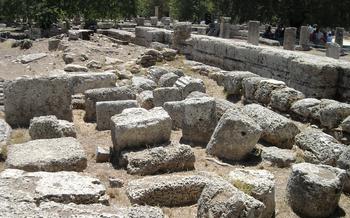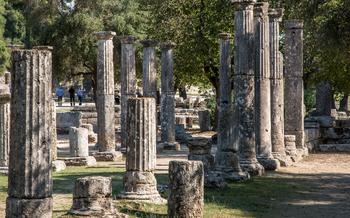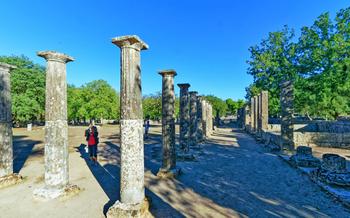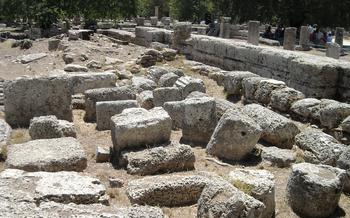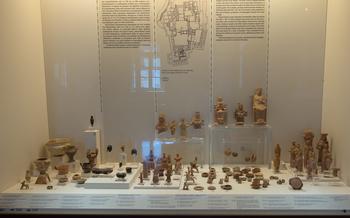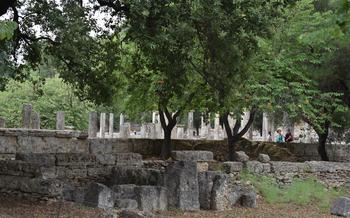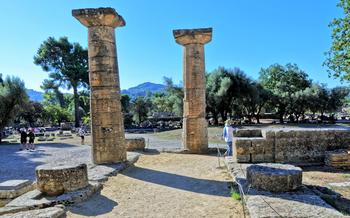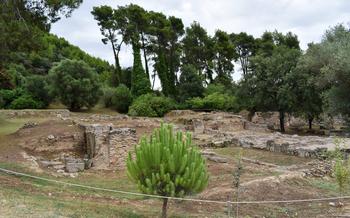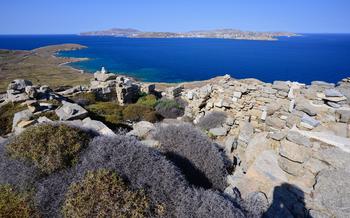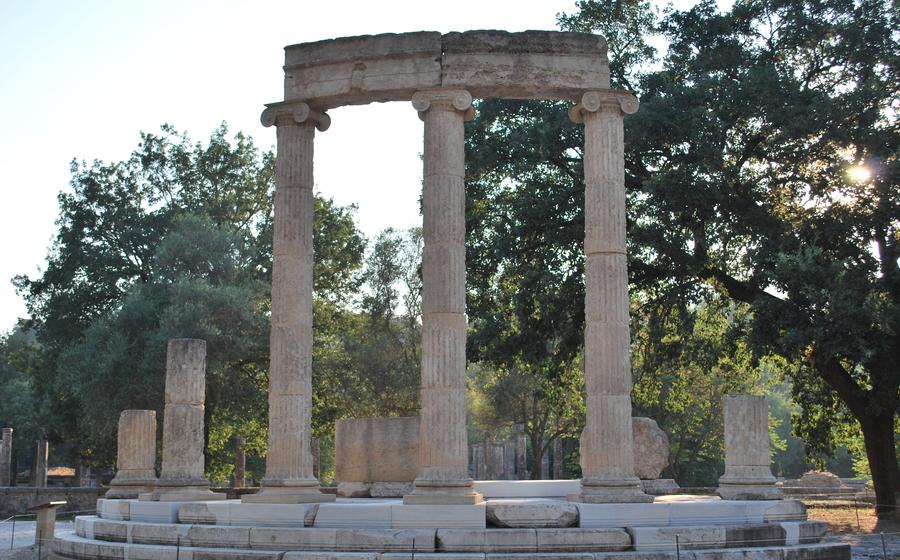
Ancient Messene
- Unveiling the Ancient Wonder: A Journey to Messene
- A Stroll Through Time: Exploring the Ruins of Ancient Messene
- A Masterpiece of Fortifications: The Walls of Ancient Messene
- Echoes of the Past: The Sanctuary of Asclepius
- A Haven for Athletes: The Ancient Messene Stadium
- Theatrical Delights: The Ancient Messene Theater
- Ode to Poseidon: The Temple of Poseidon
- Artemis, Protector of the Wild: The Temple of Artemis Limnatis
- Honoring the Gods: The Temple of Zeus Ithomatas
- Whispers of the Past: The Museum of Ancient Messene
- Trekking Through Time: The Ancient Messene Hiking Trails
- Gastronomic Delights: Savoring Messinian Cuisine
- A Photographer's Paradise: Capturing the Beauty of Ancient Messene
- Insider Tip: Unveiling Hidden Gems
Unveiling the Ancient Wonder: A Journey to Messene
Ancient Messene, nestled in the heart of the Peloponnese, stands as a testament to ancient Greece's architectural prowess and historical significance. A journey to this archaeological marvel promises an encounter with a bygone era, where history, nature, and culture harmoniously intertwine.
As you approach Messene, the awe-inspiring walls that once defended this ancient city come into view, hinting at the grandeur that awaits. Step through the gates and be transported back in time as you wander amidst well-preserved ruins, each stone whispering secrets of a glorious past.
The natural beauty of the Messinian landscape adds to the allure of this ancient site. Surrounded by rolling hills, verdant valleys, and shimmering rivers, Messene offers a feast for the eyes. Whether you're an avid historian, an architecture enthusiast, a nature lover, or simply seeking a unique travel experience, Ancient Messene has something to offer everyone.
Practical Information:
- Location: Ancient Messene is situated in the southwestern Peloponnese, approximately 25 kilometers northeast of Kalamata.
- Getting There: The most convenient way to reach Ancient Messene is by car. The site is well-connected by a network of roads, making it easily accessible from major cities in Greece.
- Opening Hours: Ancient Messene is open to the public daily from 8:00 AM to 8:00 PM during the summer months and from 8:00 AM to 5:00 PM during the winter months.
- Admission: The entrance fee for Ancient Messene is 12 euros for adults, 6 euros for students, and free for children under 18 years old.
A Stroll Through Time: Exploring the Ruins of Ancient Messene
As you step through the ancient ruins of Messene, you'll be greeted by a breathtaking glimpse into the past. The Agora, once the bustling center of the city, now lies in ruins, but its grandeur is still evident in the well-preserved foundations and remnants of stoas, shops, and temples.
Further exploration leads you to the sacred precinct, where the majestic Temple of Zeus Ithomatas stands as a testament to the city's religious devotion. Although only its foundations remain, the temple's imposing size and intricate architectural details hint at its former glory.
The stadium, an impressive display of engineering prowess, is a reminder of Messene's sporting traditions. Imagine the roar of the crowd as athletes competed in footraces, wrestling, and other athletic contests.
Finally, don't miss the theater, a cultural hub where ancient dramas and comedies once captivated audiences. The well-preserved seating rows and stage provide a glimpse into the world of ancient Greek entertainment.
A Masterpiece of Fortifications: The Walls of Ancient Messene
Defensive Prowess: The walls of Ancient Messene stand as a testament to the defensive prowess of its ancient architects. Constructed in the 4th century BC, these towering fortifications were designed to protect the city from invasion. Their impressive height and thickness, coupled with strategically placed towers and gates, made them an impenetrable barrier.
Architectural Ingenuity: Beyond their defensive capabilities, the walls of Ancient Messene showcase remarkable architectural ingenuity. Built using massive blocks of stone, they seamlessly blend functionality with aesthetics. The walls' intricate construction techniques, including the use of interlocking blocks and carefully engineered drainage systems, demonstrate the advanced engineering skills of the ancient Messenians.
Integration with the Landscape: The walls of Ancient Messene were not merely defensive structures but also an integral part of the city's urban design. They skillfully followed the contours of the surrounding hills, creating a harmonious relationship between the city and its natural environment. This integration allowed for strategic vantage points, providing defenders with a clear view of the surrounding terrain.
Preserved Sections: Despite the passage of time and the ravages of history, substantial sections of the walls of Ancient Messene remain remarkably well-preserved. Visitors can still marvel at their imposing height, intricate construction, and strategic placement. These preserved sections offer a glimpse into the defensive prowess and architectural ingenuity of this ancient city.
Echoes of the Past: The Sanctuary of Asclepius
Nestled within the ancient city of Messene, the Sanctuary of Asclepius stands as a testament to the healing traditions of ancient Greece. Dedicated to the god of medicine, Asclepius, this sacred site served as a place of refuge and rejuvenation for those seeking relief from ailments and injuries.
As you approach the sanctuary, the serene atmosphere envelops you, transporting you back in time. The ruins of the temple, once a place of worship and healing rituals, still exude a palpable energy that speaks of the reverence and hope that permeated this sacred space.
Within the sanctuary, you'll discover a wealth of votive offerings left by grateful pilgrims who sought the healing touch of Asclepius. These offerings, ranging from small clay figurines to intricate marble sculptures, provide a glimpse into the lives and beliefs of those who came to this sacred site in search of solace and restoration.
As you explore the architectural remnants of the sanctuary, you'll marvel at the skill and artistry of the ancient builders. The well-preserved foundations, columns, and friezes hint at the grandeur and beauty that once adorned this sacred space.
The Sanctuary of Asclepius is not only a place of historical significance but also a site of exceptional scenic beauty. Situated on a hilltop overlooking the fertile Messenian countryside, the sanctuary offers breathtaking views that will leave you in awe. As you gaze upon the rolling hills, olive groves, and distant mountains, you'll understand why this place was chosen as a sanctuary for healing and rejuvenation.
A Haven for Athletes: The Ancient Messene Stadium
Nestled amidst the ruins of ancient Messene, the ancient stadium stands as a testament to the city's sporting prowess and cultural significance. Constructed in the 4th century BC, this impressive structure mirrored the grand stadiums of Olympia and Delphi, showcasing the city's commitment to athleticism and community gatherings.
The stadium's design reflects the architectural ingenuity of its time. With a length of approximately 210 meters and a width of 33 meters, it could accommodate a significant number of spectators eager to witness the athletic contests. The stepped seating, meticulously crafted from local limestone, provided ample viewing space, ensuring that everyone had an unobstructed view of the action unfolding on the central field.
The stadium hosted a variety of sporting events, including footraces, wrestling, discus, and javelin competitions. These events were not merely displays of physical prowess but also held deep cultural and religious significance, honoring the gods and fostering a sense of community among the Messenians.
Beyond its sporting function, the stadium served as a venue for other public gatherings and celebrations. It was a place where citizens could come together to witness theatrical performances, religious ceremonies, and political assemblies. The stadium's acoustics, carefully engineered to carry the voices of speakers and performers, ensured that every word resonated throughout the vast space.
Today, the ancient stadium of Messene stands as a poignant reminder of the city's rich sporting traditions and cultural heritage. As visitors explore its well-preserved ruins, they can almost hear the roar of the crowd, cheering on their favorite athletes or immersing themselves in the spectacle of ancient Greek sporting events.
Theatrical Delights: The Ancient Messene Theater
Nestled amidst the ruins of ancient Messene, the theater stands as a testament to the city's rich cultural heritage. Built in the 4th century BC, the theater once hosted dramatic performances that captivated audiences with tales of gods, heroes, and tragic love.
Architectural Masterpiece: The theater's design showcases the architectural prowess of ancient Greek builders. Its horseshoe-shaped auditorium, carved into the natural slope of a hill, could accommodate up to 5,000 spectators. The stage, adorned with intricate carvings and sculptures, provided a grand platform for actors to deliver their lines.
Acoustics and Sightlines: The theater's acoustics are a marvel of ancient engineering. Even today, the spoken word carries clearly throughout the auditorium, allowing performers to be heard without amplification. The carefully designed sightlines ensure that every spectator has an unobstructed view of the stage.
Events and Festivals: In ancient times, the theater was a hub of cultural activity, hosting a variety of performances, including tragedies, comedies, and musical recitals. Today, the theater is once again brought to life during the summer months when it hosts a series of events and festivals. Visitors can enjoy performances of ancient Greek plays, concerts, and other cultural events, creating a magical atmosphere that transports them back in time.
Ode to Poseidon: The Temple of Poseidon
Majestically overlooking the tranquil waters of the Gulf of Kalamata, the Temple of Poseidon stands as a testament to the ancient Greeks' reverence for the sea god. Constructed in the early 5th century BC, this Doric-style temple exudes an aura of power and grandeur.
Architectural Marvel: The temple's imposing presence is accentuated by its well-preserved Doric columns, which rise gracefully towards the heavens. The intricate carvings and sculptures adorning the pediments and metopes depict scenes from Greek mythology, showcasing the exceptional craftsmanship of ancient artisans.
Historical Significance: The Temple of Poseidon served as a religious and ceremonial center for the ancient Messenians, who sought the god's favor for safe sea voyages and bountiful fishing. The temple's strategic location atop a hill overlooking the harbor allowed the Messenians to keep watch over their maritime activities.
Archaeological Treasure: In addition to its architectural significance, the Temple of Poseidon has yielded a wealth of archaeological treasures. Excavations at the site have unearthed numerous artifacts, including pottery shards, bronze figurines, and votive offerings, providing valuable insights into the religious practices and daily lives of the ancient Messenians.
A Timeless Legacy: Today, the Temple of Poseidon stands as a poignant reminder of the rich cultural heritage of Ancient Greece. Its enduring beauty and historical significance continue to captivate visitors, who come from far and wide to admire this architectural masterpiece and pay homage to the sea god who once reigned over these waters.
Artemis, Protector of the Wild: The Temple of Artemis Limnatis
Nestled amidst a serene natural setting, the Temple of Artemis Limnatis stands as a testament to the enduring legacy of the Greek goddess Artemis, protector of the wild and untamed. This ancient sanctuary, dedicated to the revered deity, exudes an aura of tranquility and reverence, inviting visitors to step back in time and immerse themselves in the sacred traditions of ancient Greece.
The temple's architecture reflects the harmonious blend of simplicity and elegance that characterizes Greek classical style. Its well-preserved Doric columns, intricately carved with delicate fluting, support an entablature adorned with triglyphs and metopes. The metopes, once adorned with vibrant sculptures depicting scenes from Greek mythology, offer a glimpse into the rich storytelling traditions of the ancient world.
Beyond its architectural beauty, the Temple of Artemis Limnatis holds deep mythological significance. Artemis, known as the protector of wild animals and the goddess of childbirth, was revered by the ancient Greeks for her connection to the natural world. The sanctuary served as a place of worship and pilgrimage, where devotees sought her blessings and protection.
Archaeological excavations at the site have unearthed a wealth of artifacts, including votive offerings, statuettes, and inscriptions, providing valuable insights into the religious practices and beliefs of the ancient Messenians. These discoveries shed light on the profound reverence with which Artemis was held, as well as the central role she played in the daily lives of the people.
Today, the Temple of Artemis Limnatis stands as a reminder of the enduring power of ancient Greek religion and mythology. Its idyllic setting, surrounded by lush greenery and the gentle murmur of a nearby river, invites visitors to connect with the sacredness of the natural world and experience the timeless allure of ancient Greece.
Honoring the Gods: The Temple of Zeus Ithomatas
The Temple of Zeus Ithomatas stands majestically as a testament to the religious devotion and architectural prowess of the ancient Messenians. Dedicated to Zeus, the supreme deity of the Greek pantheon, this temple once served as the spiritual heart of the city.
Excavations have revealed the impressive scale and intricate details of the temple. Its massive foundations, towering columns, and finely carved pediments hint at the grandeur that once adorned this sacred space. The temple's architectural style reflects the transition from Doric to Ionic, showcasing the evolution of Greek architecture during the 5th century BC.
The Temple of Zeus Ithomatas held immense religious significance for the ancient Messenians. It was a place of worship, pilgrimage, and celebration. The temple's altar, where offerings were made to Zeus, has been carefully preserved, providing a glimpse into the religious rituals and practices of the past.
In addition to its religious importance, the Temple of Zeus Ithomatas also played a crucial role in the political and social life of Ancient Messene. It served as a venue for official ceremonies, public gatherings, and the administration of justice. The temple's imposing presence and sacred atmosphere added gravitas to these events, reinforcing the authority and legitimacy of the city's rulers.
Today, the ruins of the Temple of Zeus Ithomatas stand as a reminder of the deep-rooted religious beliefs and cultural heritage of the ancient Messenians. Visitors can wander among the fallen columns, marvel at the intricate carvings, and imagine the grandeur of this once-sacred space, where the ancient Greeks paid homage to their most powerful deity.
Whispers of the Past: The Museum of Ancient Messene
Step into the Museum of Ancient Messene and embark on a journey through time, where ancient artifacts whisper tales of a glorious past. Discover the rich history and culture of this once-thriving city through a diverse collection of archaeological treasures. Gaze upon intricate pottery, finely crafted sculptures, and bronze artifacts that showcase the exceptional artistry of ancient Messene. Learn about the city's religious beliefs through votive offerings and inscriptions dedicated to various deities. Interactive displays and educational programs bring the past to life, allowing you to delve deeper into the fascinating stories behind the artifacts. Immerse yourself in the whispers of history and gain a profound appreciation for the legacy of Ancient Messene.
Trekking Through Time: The Ancient Messene Hiking Trails
Lace up your hiking boots and embark on an unforgettable journey through time as you explore the ancient trails of Messene. These paths, once trodden by the city's inhabitants and visitors, now offer a unique opportunity to immerse yourself in the region's rich history and natural beauty.
Choose from a variety of well-marked trails that cater to different fitness levels and interests. As you wander along these ancient routes, admire the breathtaking views of the surrounding countryside, with its rolling hills, olive groves, and sparkling sea in the distance. Keep an eye out for historical landmarks along the way, such as ancient ruins, bridges, and watermills, which offer a glimpse into the lives of those who came before.
The trails also provide an excellent opportunity to appreciate the diverse flora and fauna of the region. Breathe in the fragrant scents of wild herbs and flowers, and listen for the melodious songs of birds. With a little luck, you might even spot some of the local wildlife, such as hares, foxes, and various bird species.
Whether you prefer a leisurely stroll or a challenging hike, the Ancient Messene hiking trails offer a rewarding experience for all. So, grab your camera, pack a picnic lunch, and set off on an adventure that will transport you back in time.
Gastronomic Delights: Savoring Messinian Cuisine
A culinary journey through Ancient Messene unveils a treasure trove of flavors that delight the palate and transport you to a realm of gastronomic wonders. Indulge in the region's signature dishes, such as the succulent "tsigarides," thinly sliced pork slow-cooked to perfection in a rich tomato sauce, or the aromatic "pasteli," a sweet treat crafted from honey, sesame seeds, and nuts.
Embrace the simplicity and freshness of Messinian cuisine, where local ingredients take center stage. Sample the region's renowned olive oil, boasting a delicate fruity flavor that enhances every dish. Pair it with a glass of locally produced wine, as the Messinian vineyards yield vintages that rival those of more famous wine regions.
Seafood enthusiasts will rejoice in the bounty of the Ionian Sea, which graces the shores of Ancient Messene. From the succulent grilled octopus to the tender red mullet, each bite is a testament to the region's connection to the sea.
When it comes to dining, immerse yourself in the authentic atmosphere of traditional tavernas nestled in the heart of Ancient Messene. These family-run establishments exude a sense of warmth and hospitality, where you can savor the flavors of homemade dishes while engaging with the locals.
As you embark on your culinary adventure, allow yourself to be guided by the aromas and flavors that permeate the air. Messinian cuisine is a testament to the region's rich history and cultural heritage, promising a feast for your senses that will linger in your memory long after your visit.
A Photographer's Paradise: Capturing the Beauty of Ancient Messene
Ancient Messene is a photographer's paradise, offering a plethora of opportunities to capture stunning images that encapsulate its rich history and natural beauty. The ruins of the ancient city, with their imposing walls, grand temples, and well-preserved theater, provide a backdrop for dramatic and evocative photographs.
Luminous in the soft glow of the morning light or bathed in the golden hues of sunset, the ancient structures take on a magical aura, inviting photographers to capture their timeless beauty. The harmonious blend of architecture and nature creates a picturesque canvas, where every angle reveals a new composition waiting to be immortalized.
From sweeping panoramas of the entire site to intricate details of architectural elements, Ancient Messene offers endless possibilities for creative photography. The play of light and shadow on the weathered stones, the vibrant colors of the surrounding landscape, and the occasional presence of wildlife add to the visual interest of the scene.
Whether you're a seasoned professional or an enthusiastic amateur, Ancient Messene is a place where your photographic skills will be put to the test. With every click of the shutter, you'll capture a piece of history, preserving the legacy of this remarkable ancient city for generations to come.
Insider Tip: Unveiling Hidden Gems
Beyond the confines of Ancient Messene, the region beckons with an array of hidden gems waiting to be discovered. Venture into the picturesque Messinian countryside, dotted with traditional villages, olive groves, and vineyards. Immerse yourself in the region's rich history by visiting nearby ancient sites such as Nestor's Palace in Pylos or the Temple of Apollo Epicurius in Bassae. These lesser-known treasures offer a glimpse into the ancient world and provide a unique perspective on the region's past.
To fully embrace the local culture, time your visit to coincide with one of the many festivals held throughout the year. These vibrant celebrations showcase traditional music, dance, and cuisine, providing an opportunity to immerse yourself in the local way of life. Engage with the welcoming community by attending village gatherings, chatting with locals, and tasting their homemade delicacies. These genuine interactions will enrich your understanding of the region and create lasting memories.
